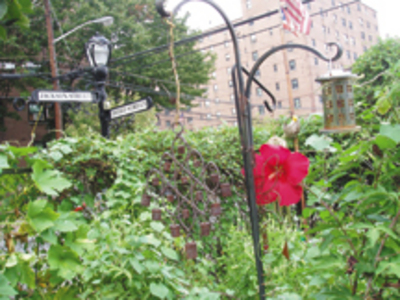What do eggplants, pinto beans, pumpkins, hops, and fig trees have in common? They’re all accounted for in at least one of the 53 small gardens on the corner of Third and Jackson streets.
The garden owners are a diverse group, according to the unofficial keeper of the grounds, Alberto Colon. Colon lives at Fifth and Harrison streets and he has been gardening in the lot for three years. His well-decorated plot is the first one inside the 53-plot community garden.
“I love gardening,” he said.
The gardeners are young and old, and from different races and professions. Like 80-year-old green thumb, Lucy, from the Jackson Gardens building next door, who has grown a beautiful array of colorful flowers.
Or the weekend beer-maker who’s growing hops on a trellis along the Jackson Street pathway.
“I told him to take me to his house and show me how to do it,” Colon said of the brewmaster.
There’s also Colon’s cousin, a young teacher, who owns a home nearby.
Marjorie Laue, a founding member of the Hoboken Gardening Club, is technically in charge, but she has farmed out the duties, so to speak. The city owns the garden but allows the organizers to manage the property as they see fit.
“All we give them is water,” said Dave Calamoneri, of the Department of Environmental Services. “They do the rest.”
No apples this year
This year, it has been particularly hard to grow, Colon said, “because of the weather and the water.”
The apple tree was especially bare this year. “Didn’t give an apple,” Colon said.
The cherry tree only gave fruit once, “but they’re delicious.”
Some residents get food directly from New Jersey farms.
________
Gardeners pay $10 per year for water and are given a key to get into the grounds.
“They water their own stuff,” Colon said. “If you kill it, they’re going to blame you.”
A garden untouched
At least one gardener said there was some hesitation to talk about this oasis alongside the projects, because of the fear the city might reclaim the land and use it for something else.
“I don’t want them to sell it or use it to build something,” said the gardener, who preferred to remain anonymous. “We love this place.”
City officials said the plot of land was larger at one time – large enough that it wrapped around the Housing Authority building Jackson Gardens – and that some of the property was sold off.
City spokesman Paul Drexel said the city has no intention to interfere with the gardens.
Local gardening cooperatives
A member of the Hoboken Garden Club, Valerie D’Antonio, said that many people in Hoboken participate in an informal program called Community Supported Agriculture (CSA).
D’Antonio said local consumers pay a lump sum per year to buy a portion of a local farmer’s output; in her case, she and many other Hobokenites support Catalpa Grove Farms in Wantage, Sussex County.
Bob Foster from the Hoboken Historical Museum is also a participant in that group. Foster’s home is one of four drop-off points in Hoboken. He said CSA is different than other programs like Food Direct.
“A lot of these places have a lot of middle people involved,” he said, whereas farmer Rich Sisto delivers the goods to Foster directly.
Sisto also delivers to Jersey City and Mahwah.
For more information about Catalpa Grove Farms, visit www.jerseygrown.com. – TJC
Timothy J. Carroll may be reached at tcarroll@hudsonreporter.com.
